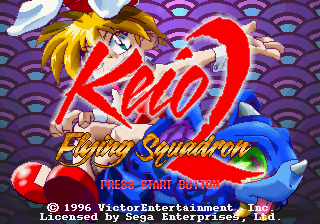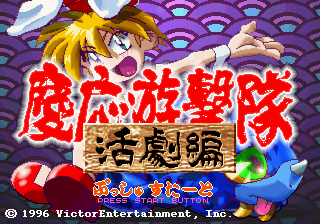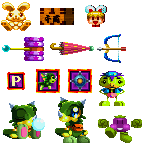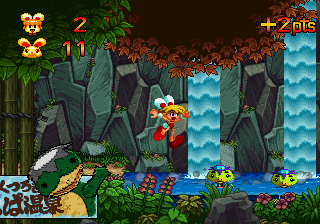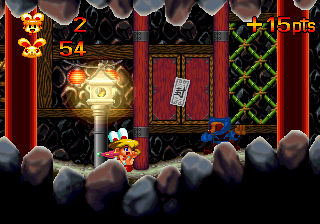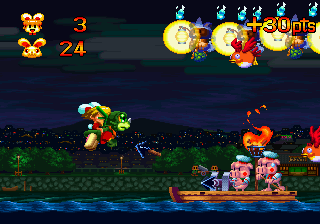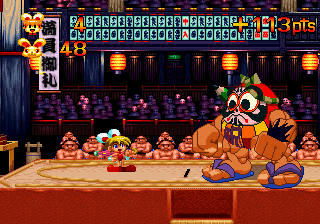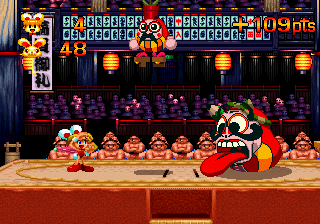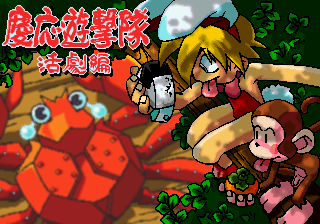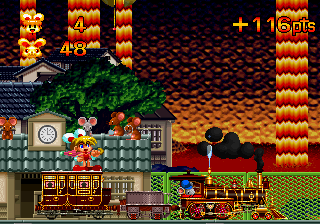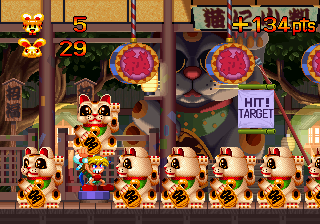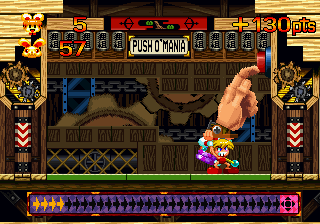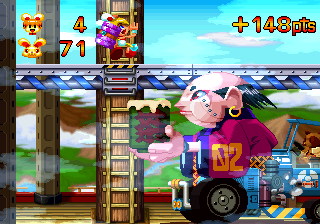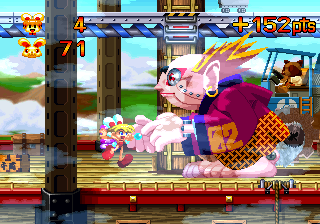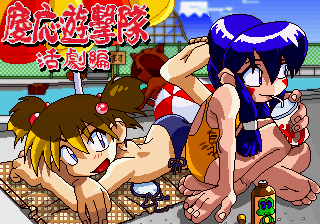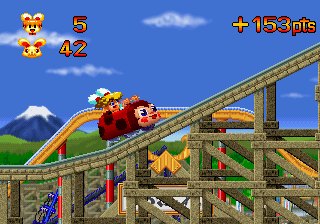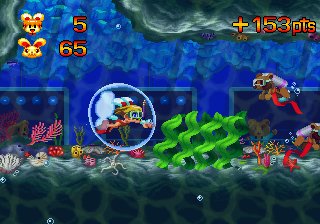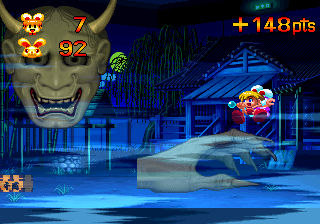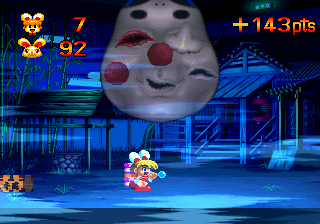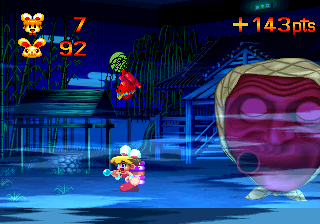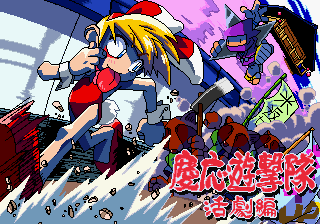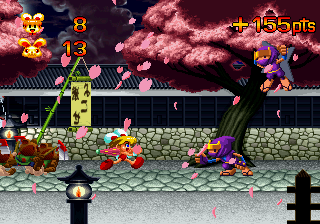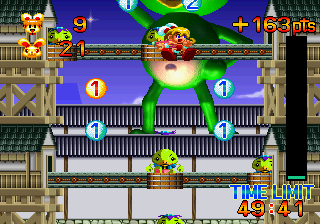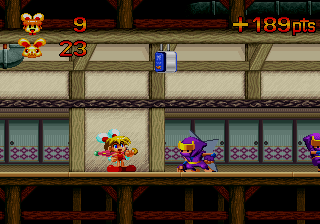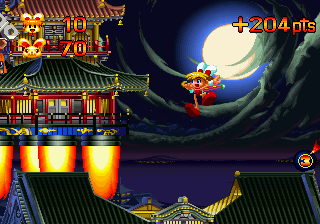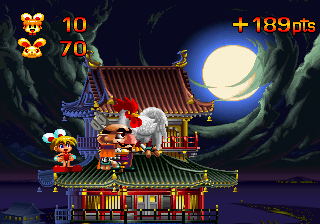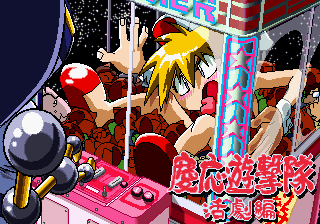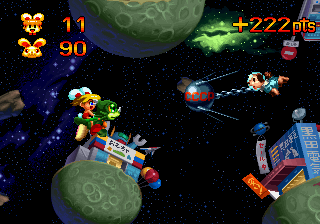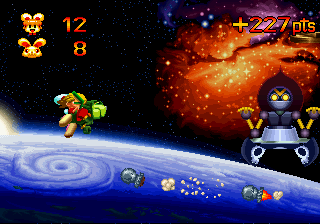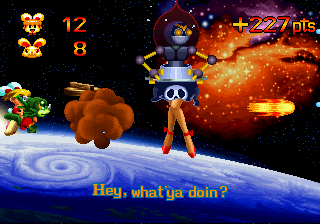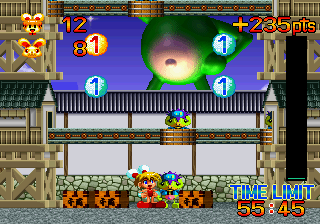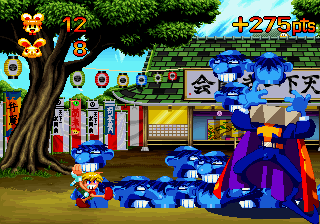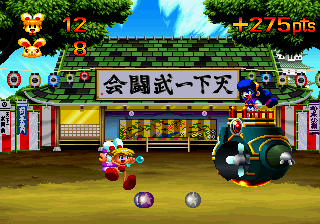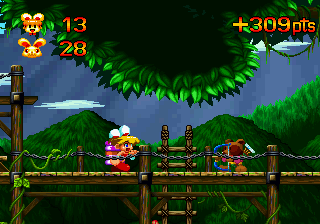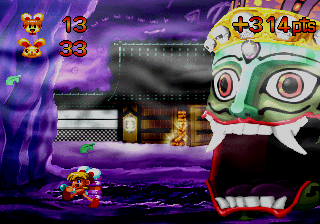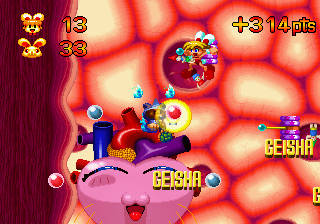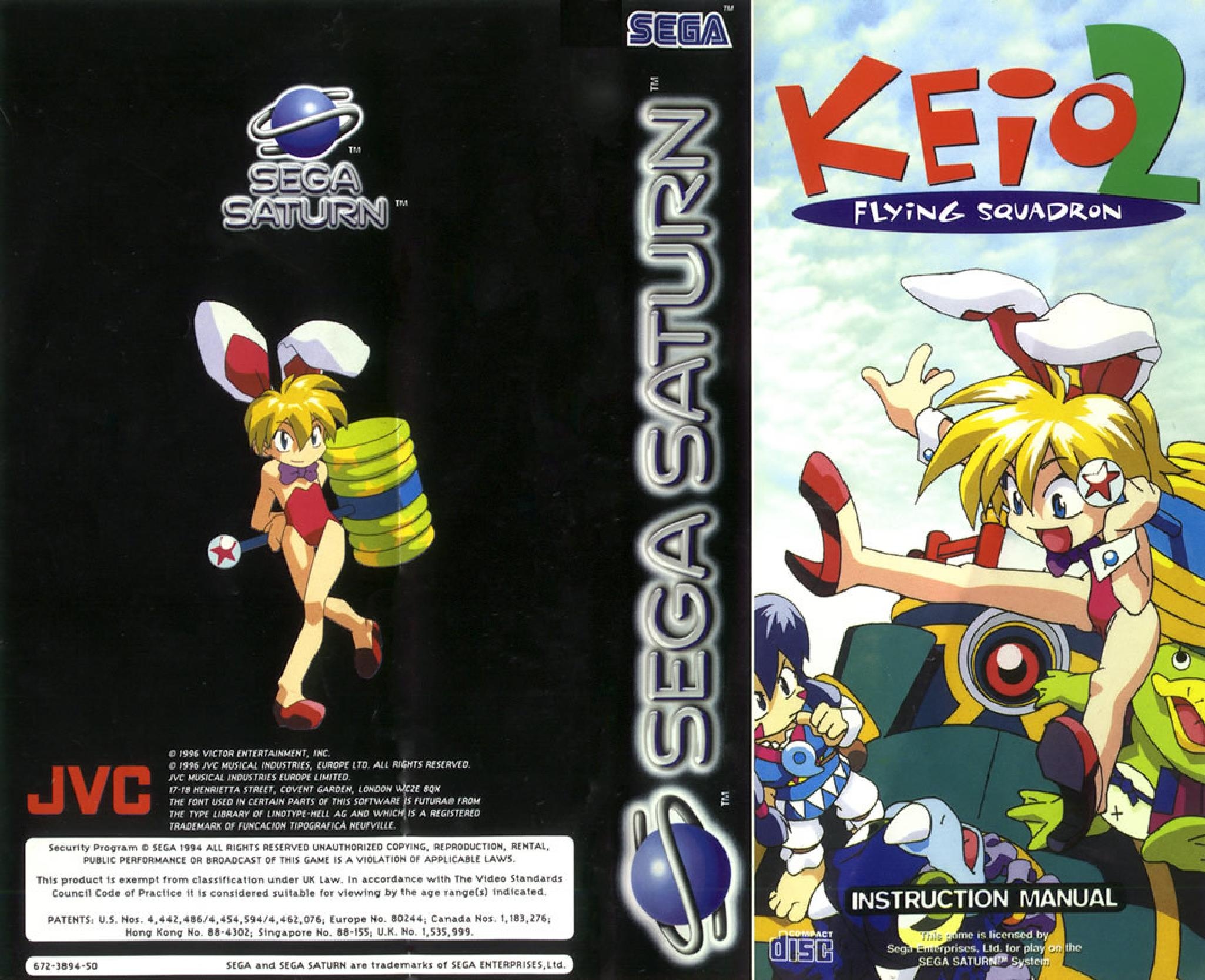Keio Flying Squadron 2, known as Keiou Yuugekitai: Katsugeki-hen (慶応遊撃隊 活劇編) in Japan, is the sequel to Keio Flying Squadron. It was released for the Sega Saturn in Japan and Europe. The game features animated cutscenes provided by Studio Pierrot, who also provided the animation for the cutscenes in the first game.
Story
The second installment of the series continues the story of Rami Nana-Hikari's adventures as the keeper of the Secret Treasure. A year has passed since the apocalyptic disaster which left a great crater in the center of Edo City. The destruction wrought major economic consequences and while much investment was poured into the public works for the new Edo Castle, the citizens were all feeling the pinch of the recession.
Dr. Pon Eho was no exception. Although a freak of nature with an astronomical IQ of 1400, hard reality forced the genius raccoon to become a laborer in the construction of the New Castle. One day, while he was shoveling away some gravel near the center of the crater, he unearthed the Secret Treasure Scroll and one of the Six Magical Orbs! With the knowledge that the six Orbs together would bring him enormous wealth, he quickly left his job in search of the remaining five Orbs listed on the Scroll's map.
Meanwhile, Himiko Yamatai, "the Pompous Queen of the Ancients," makes a dramatic appearance at the Nana-Hikari family's dinner table and grabs the family's Magical Orb. But before she can get away, Dr. Pon ambushes her and steals it. Rami makes chase and joins the race for the great treasure, starting her on her new adventure.
Gameplay
The game is a side-scrolling platformer. Rami walks with  and
and  and crouches with
and crouches with  . She breaks into a run after walking a short distance in a direction. She jumps with
. She breaks into a run after walking a short distance in a direction. She jumps with  and jumps higher if the button is held down longer. She jumps off of platforms with
and jumps higher if the button is held down longer. She jumps off of platforms with  +
+ . She can pick up items with
. She can pick up items with  and throw them with
and throw them with  . If she picks up a weapon, which are sometimes dropped by enemies after they are defeated, she can use it with
. If she picks up a weapon, which are sometimes dropped by enemies after they are defeated, she can use it with  . Rami can set items down or drop her weapon with
. Rami can set items down or drop her weapon with  +
+ . Enemies can be defeated by hitting them with a weapon, throwing an object at them, or jumping on top of them. Rami climbs ladders with
. Enemies can be defeated by hitting them with a weapon, throwing an object at them, or jumping on top of them. Rami climbs ladders with  and
and  . Rami loses her weapon if she takes damage or loses a life if she takes damage without holding a weapon.
. Rami loses her weapon if she takes damage or loses a life if she takes damage without holding a weapon.
Two of the stages retain the shoot-'em-up style of the first game. Rami rides Spot, and the pair can be moved in any direction with the D-pad. Spot shoots with  ,
,  , or
, or  , which shoots fireballs and Spot's subweapon (if equipped) simultaneously. Spot's movement speed can be changed with
, which shoots fireballs and Spot's subweapon (if equipped) simultaneously. Spot's movement speed can be changed with  (slow),
(slow),  (medium), or
(medium), or  (fast). The player loses a life and must start the stage over from the beginning if Spot is hit by an enemy.
(fast). The player loses a life and must start the stage over from the beginning if Spot is hit by an enemy.
Defeating most enemies rewards points, but there are some enemies (such as miners) that are considered passive and deduct points when defeated. Points are also deducted for taking damage or losing a life. The points are used in the Extras feature (accessed through the main menu), which unlocks helpful hints and behind-the-scenes extras depending on the highest and lowest scores achieved through playing.
Weapons
|
|
Atami (熱海), The Hammer of Dreams
|
Rami can hit enemies using the hammer with  or throw it with or throw it with  + + . .
|
|
|
Kinugawa (鬼怒川), The Umbrella of Love
|
When closed, Rami can use the umbrella as a striking weapon with  , similar to the hammer. Rami can open the umbrella with , similar to the hammer. Rami can open the umbrella with  + + , which protects her from falling objects, lets her float gently from great heights, and in some stages, lets her fly upwards by catching gusts of wind. , which protects her from falling objects, lets her float gently from great heights, and in some stages, lets her fly upwards by catching gusts of wind.
|
|
|
Kusatsu (草津), The Arrow of Hope
|
Rami can use the bow and arrow to attack enemies. It can be aimed in horizontal or in upward diagonal directions using the D-pad. She can draw the arrow for longer distances by holding  ; the arrow is fired when the button is released. This weapon cannot be used while jumping. ; the arrow is fired when the button is released. This weapon cannot be used while jumping.
|
Items
Platforming
|
|
Rabbits
|
| Collect 100 to earn an extra life.
|
|
|
Senryo Box (千両 箱)
|
| Jump on or hit to release an item.
|
|
|
Rami Icon
|
| Gives the player an extra life.
|
|
|
Eggplant
|
| Gives the player an extra continue.
|
|
|
Kappa
|
| Rami can use these creatures as a spring to reach higher places. She can also pick them up and move them.
|
|
|
Spot
|
| Checkpoint where Rami is revived after losing a life.
|
Flying
|
|
P
|
| Upgrades the power of Spot's fireballs.
|
|
|
Homing Spot Jrs.
|
| Changes Spot's subweapon to Homing Spot Jrs., which shoots baby dragons like homing missiles at enemies.
|
|
|
Explosive Throwing Stars
|
| Changes Spot's subweapon to Explosive Throwing Stars, which throws stars in the opposite direction as the last pressed direction.
|
Chapters
Look Ma, There's Sumo Stadium
|
|
The Forest
|
|
|
|
|
The Caverns
|
|
|
|
|
Edo River
|
|
|
|
|
Sumo Stadium
|
|
|
The Lost Underground Kingdom
|
|
Rodent Kingdom
|
|
|
|
|
Feline Shrine
|
|
|
|
|
Gaudy Space Junk
|
|
|
|
|
The Upper Deck
|
|
|
Recreational Facilities Out of Control
|
|
Amusement Park
|
|
|
|
|
Aquarium
|
|
|
|
|
Haunted Mansion
|
|
|
Running the Gauntlet at Ninja Castle
|
|
Castle Promenade
|
|
|
|
|
Bonus
|
| The red balls award points and the blue balls subtract points.
|
|
|
Ninja Castle
|
|
|
|
|
Shogun's Quarters
|
|
|
Chaos at the Martial Arts Tournament
|
|
Outer Space
|
|
|
|
|
Bonus
|
| The red balls award points and the blue balls subtract points.
|
|
|
Martial Arts Tournament
|
| The first opponent is randomly chosen between Cardinal Xavier (God Fearing) and Benkei Musashibou (Kabuki Fighter), but the second fight is always against Himiko Yamatai (Pompous Queen).
|
|
|
Mt. Fuji Forest
|
|
|
|
|
Mt. Fuji Cavern
|
|
|
|
|
Inside the Belly
|
|
|
Versions
Localised names
Also known as
| Language
|
Localised Name
|
English Translation
|
| English
|
Keio Flying Squadron 2
|
Keio Flying Squadron 2
|
| Japanese
|
慶応遊撃隊 活劇編
|
Keiou Yuugekitai: Katsugeki-hen
|
Comparisons
- Main article: Keio Flying Squadron 2/Comparisons.
Production credits
Staff
- Screen Play: Satoru Honda
- Alchemist: Teruhito Yamaki
- Composer: Tsukasa Tawada
- Creator: Masaru Yokoura
- Artist: Naomasa Kitatani, Kenji Kawashima, Yoshiyuki Ozaki, Nobuyuki Ikigame, Daisuke Fukuda (Winds), Akito Kuroda (Winds)
- Character Design: Hiromasa Ota
- Animation: Studio Pierrot
- Animation Studio: Yoshitada Iwasa and Wasawa Construction Co.
- Game Advisor: Kyozo Urano, Kazuya Tominaga
- Tester: Yuji Yokoi, Yoshinori Itakura (Pole To Win)
- Title Text: Satoshi Tsuji
- Technical Director: Yoshiaki Iwasawa
- Director: Yasushi Endo
- Producer: Toshiyuki Nagai, Atsushi Okabe
Voice
- Rami: Samantha Paris
- Dr. Pom, Spot: Roger Jackson
- Himiko, Yoshiko: Elaine A. Clark
- Benkei: Toby Gleason
- Xavier: Don Robins
- Studio: Music Annex, San Francisco, CA
- Translation & Recording: Watanabe-Robins & Associates
Source: EU manual[6]
- Miho Kanno as Rami Nana-Hikari
- Mika Kanai as Spot Nana-Hikari and Himiko Yamatai
- Jōji Yanami as Dr. Pon Eho and Grandpa
- Keiko Yamamoto as Grandma and Funny Face #2
- Kae Araki as Yōshiko Oroshiya
- Keiji Fujiwara as Fire Raccoons, Fishing Raccoons, Sumo Wrestler #1, Sumo Wrestler #2, Funny Face #3, Castle Promenade Raccoon, Ninjas, 3-Meter Alien, Benkei Musashibō and Cardinal Xavier
- Nobuo Tobita as Umbrella Raccoon and Mech-Shogun
- Wataru Takagi as Toxic Waste Disposer
- Dai Sasahara as Yobidashi, Musashi the Sumo Champion, Funny Face #1 and Apocalypse's Heart
- Hikiko Takemasa as Hamster and Cat
- Recording Studio: Avaco Creative Studios
Magazine articles
- Main article: Keio Flying Squadron 2/Magazine articles.
Promotional material
Physical scans
| Saturn, JP
|
  Cover
|
|
|
| Saturn, EU
|
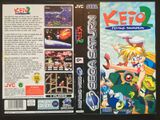 Cover
|
 Manual |
| Saturn, FR
|
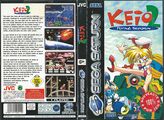 Cover
|
 Manual |
| Saturn, FR (blister pack)
|
  Cover
|
|
|
| Saturn, PT
|
 Cover
|
|
|
| Saturn, AU
|
 Cover
|
 Manual |
Technical information
- Main article: Keio Flying Squadron 2/Technical information.
References
- ↑ File:KFS2 Saturn JP Box Back.jpg
- ↑ 2.0 2.1 https://sega.jp/fb/segahard/ss/soft_licensee2.html (Wayback Machine: 2020-03-20 23:05)
- ↑ Sega Saturn Magazine, "1996-06 (1996-04-12)" (JP; 1996-03-22), page 12
- ↑ Computer Trade Weekly, "" (UK; 1996-09-30), page 24
- ↑ 5.0 5.1 Computer & Video Games, "September 1996" (UK; 1996-08-11), page 40
- ↑ File:Keio Flying Squadron 2 Sat EU Manual.pdf, page 9
- ↑ GamesMaster, "November 1996" (UK; 1996-09-26), page 50
- ↑ 576 KByte, "Október 1996" (HU; 1996-xx-xx), page 30
- ↑ CD Consoles, "Novembre 1996" (FR; 1996-xx-xx), page 163
- ↑ Famitsu, "1996-05-24" (JP; 1996-05-10), page 29
- ↑ Fun Generation, "08/96" (DE; 1996-07-10), page 83
- ↑ GameFan, "Volume 4, Issue 7: July 1996" (US; 1996-xx-xx), page 13
- ↑ Joypad, "Juillet/Août 1996" (FR; 1996-0x-xx), page 68
- ↑ Joypad, "Novembre 1996" (FR; 1996-1x-xx), page 78
- ↑ MAN!AC, "07/96" (DE; 1996-06-12), page 54
- ↑ Mega Force, "Novembre/Décembre 1996" (FR; 1996-1x-xx), page 86
- ↑ Mega Fun, "09/96" (DE; 1996-08-21), page 80
- ↑ Mean Machines Sega, "October 1996" (UK; 1996-09-03), page 66
- ↑ Mean Machines Sega, "November 1996" (UK; 1996-10-04), page 75
- ↑ Player One, "Novembre 1996" (FR; 1996-xx-xx), page 126
- ↑ Saturn Fan, "1996 No. 14" (JP; 1996-06-21), page 80
- ↑ Saturn+, "Issue 4" (UK; 1996-10-24), page 29
- ↑ Sega Power, "September 1996" (UK; 1996-08-01), page 48
- ↑ Sega Saturn Magazine, "September 1996" (UK; 1996-08-20), page 76
- ↑ Sega Saturn Magazine, "1996-08 (1996-05-10,24)" (JP; 1996-04-26), page 232
- ↑ Sega Saturn Magazine, "Readers rating final data" (JP; 2000-03), page 14
- ↑ Total Saturn, "Volume One Issue One" (UK; 1996-08-xx), page 44
- ↑ Total Saturn, "Volume One Issue Four" (UK; 1996-12-29), page 35
- ↑ Video Games, "7/96" (DE; 1996-06-26), page 96
![]() and
and ![]() and crouches with
and crouches with ![]() . She breaks into a run after walking a short distance in a direction. She jumps with
. She breaks into a run after walking a short distance in a direction. She jumps with ![]() and jumps higher if the button is held down longer. She jumps off of platforms with
and jumps higher if the button is held down longer. She jumps off of platforms with ![]() +
+![]() . She can pick up items with
. She can pick up items with ![]() and throw them with
and throw them with ![]() . If she picks up a weapon, which are sometimes dropped by enemies after they are defeated, she can use it with
. If she picks up a weapon, which are sometimes dropped by enemies after they are defeated, she can use it with ![]() . Rami can set items down or drop her weapon with
. Rami can set items down or drop her weapon with ![]() +
+![]() . Enemies can be defeated by hitting them with a weapon, throwing an object at them, or jumping on top of them. Rami climbs ladders with
. Enemies can be defeated by hitting them with a weapon, throwing an object at them, or jumping on top of them. Rami climbs ladders with ![]() and
and ![]() . Rami loses her weapon if she takes damage or loses a life if she takes damage without holding a weapon.
. Rami loses her weapon if she takes damage or loses a life if she takes damage without holding a weapon.
![]() ,
, ![]() , or
, or ![]() , which shoots fireballs and Spot's subweapon (if equipped) simultaneously. Spot's movement speed can be changed with
, which shoots fireballs and Spot's subweapon (if equipped) simultaneously. Spot's movement speed can be changed with ![]() (slow),
(slow), ![]() (medium), or
(medium), or ![]() (fast). The player loses a life and must start the stage over from the beginning if Spot is hit by an enemy.
(fast). The player loses a life and must start the stage over from the beginning if Spot is hit by an enemy.
